Artificial Intelligence: The Age Of Endarkenment

| Written by: | Emre Gorur |
| Published: | September 23, 2024 |
While the first part of this theoretical article on artificial intelligence states that the role of being the carrier of civilization’s ideal of enlightenment will now pass to machines, the second part analyzes the effects of artificial intelligence on art, specifically in metal music, and a historiography of metal’s post-internet era is carried out.
[Disclaimer: Images for this article were prepared using Microsoft Copilot]
* * *
[Disclaimer: Images for this article were prepared using Microsoft Copilot]
* * *
“Panem, circenses, credulous descent
A Gadarene charge into endarkenment”
(Anaal Nathrakh, Endarkenment, 2020)
A Gadarene charge into endarkenment”
(Anaal Nathrakh, Endarkenment, 2020)
We are slowly beginning to understand the potential of artificial intelligence and its possible consequences. Artificial intelligence is increasingly becoming a part of our daily lives, and we find ourselves in frequent discussions related to it. Moreover, even the argument that artificial intelligence will make us unemployed has been accepted by a considerable number of people. We feel that things can change radically.
In fact, the course of civilization has been relatively stagnant, especially since the second half of the 20th century. More accurately, society is lagging behind predictions of the future that have frequently appeared in science fiction movies from the past and present. For example, the progress made in automotive technology cannot be said to be very impressive. Let alone flying cars, even getting rid of fossil fuels has not yet been achieved. While natural resources are being rapidly depleted and the world population is growing uncontrollably, civilization needs a technological breakthrough that will open new horizons for itself.
The Virtual Enlightenment Process
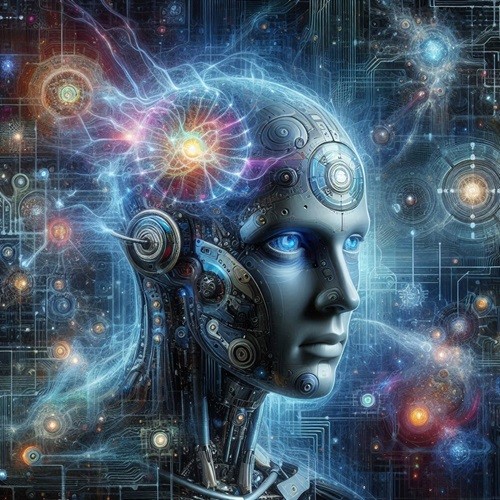
It can be argued that human civilization has historically risen on the basis of two great technological revolutions. The Neolithic Revolution, which followed the last ice age, is generally accepted to have created a rift in human history. It was this agricultural revolution that made it possible for man to abandon the principle of harmony with nature. A process based on the “enslavement” of the land, animals and, increasingly, his own kind was now underway. In this first phase of civilization, man attempted to create a reality for himself by trying to build walls between himself and nature.
This dual ontology, that is, the dualism of nature and society, has been the basis of civilized thought. Society is never considered as a sub-reality of nature, because this duality is the way to categorically separate humans from other animal species and attribute subjectivity to them. As society regresses nature, it is thought that the area of the subject (consciousness, freedom, geist...) expands. In this context, it is even possible to interpret civilization and enlightenment as identical processes. Enlightenment is the delusion of god seen by humans who are dazzled by the results of technology.
However, even though the level of technology tends to increase cumulatively, civilizations have to face structural crises and extinctions. “What man calls civilization always results in deserts,” and naturally there is a direct relationship between enlightenment periods and the course of civilizations.
The main one of these periods, which we know today as the Age of Enlightenment, was an outcome of Western civilization, which was showing symptoms of collapse, reproducing itself through colonialism. The material basis provided by taking control of new lands that could be called virgin allowed the West to update its ideology and open up space for the individual. The integration of this with a technological revolution would give great momentum to the process and create effects that would determine today’s world.
We were born into this reality. The urban societies we live in and their economic and class structures are the result of the Industrial Revolution, the second great technological development in the history of civilization. However, the level that artificial intelligence has reached makes us question whether this has come to an end. Could we be at one of the main crossroads of human history?
In fact, the process began with the internet. The most important point here, from a theoretical perspective, is that the internet-based information revolution divides social reality into material and virtual reality. The opening of a new area in human reality in this way is a sufficient basis to make it potentially the third major technological revolution. Artificial intelligence functions as the most important and dynamic result of this revolution by far.
Especially with the emergence of smart phones, one of the main characteristics of this period has become clear. As accessing information becomes easier, the need for people to store and process data themselves decreases. There is a negative correlation between the development of artificial intelligence and the ratio at which people use their brains. The need for technical knowledge in areas such as text production, visual creation, design, voice-over, and coding has already decreased considerably. Activities such as learning a foreign language are now becoming unnecessary. In short, it can be said that the information-human connection is gradually being broken.
Deep Blue’s defeat of chess world champion Garry Kasparov in 1997 was an unexpected development for most. Now, the balance has changed significantly. After 27 years, artificial intelligence has begun to surpass human levels in almost all evaluation criteria used. We are entering a period in which human cognitive capacity will no longer be able to compete with artificial intelligence.
The situation that human intellectual abilities lag behind those of artificial intelligence will inevitably lead to a gradual decrease in the need for it. It can be said that layoffs due to artificial intelligence are currently tending to become routine in certain sectors. The fact that artificial intelligence can perform tasks that require mental labor faster, more efficiently and more accurately than humans will condition radical changes in the structure of modern society. It seems quite possible that huge waves of unemployment will occur on a global scale and a new generation of “machine breakers” will emerge.
At this point, we come to a distinction that gained categorical meaning with the Industrial Revolution: Mental and manual labor. While this division of labor is among the founding elements of modern society, its elimination is also one of the conditions of communism. However, contrary to this utopian expectation, the duality in question tends to break apart, never to come together again. In the Industrial Revolution, machines were able to partially penetrate the field of manual labor. Today, the path of artificial intelligence in the field of mental labor is very open.
The fact that man is alienated from knowledge and excluded from the field of intellectual labor due to his mental capacity deficiency indicates that he will be pushed into an era of “ignorance”. In this article, this phenomenon will be called the Age of Endarkenment, adopting the name given to Anaal Nathrakh’s latest album.
But there is another side to the coin. When the focus is shifted from humans to artificial intelligence, it is realized that civilization has not given up on the ideal of enlightenment, but on the contrary, it is being tried to be reconstructed on a stronger basis.
Currently, artificial intelligence is still in its infancy. All current artificial intelligence applications are considered under the title of artificial special intelligence. In other words, they are all software developed for a specific area, such as solving equations or playing Go. In addition, it is not possible to say that they can go beyond compiling existing data and process information in a holistic way by connecting them. However, it is envisaged that this will be overcome at some point and an intelligence explosion will occur, referred to as artificial general intelligence or technological singularity.
According to the theory in question, once artificial intelligence categorically surpasses human intellectual capacity, it will no longer need human intervention. Imagine a machine intelligence that can produce more advanced versions of itself. This intelligence can perfect itself in a cycle that tends to infinity, and even the level it will reach in a short time will probably push the limits of human imagination.
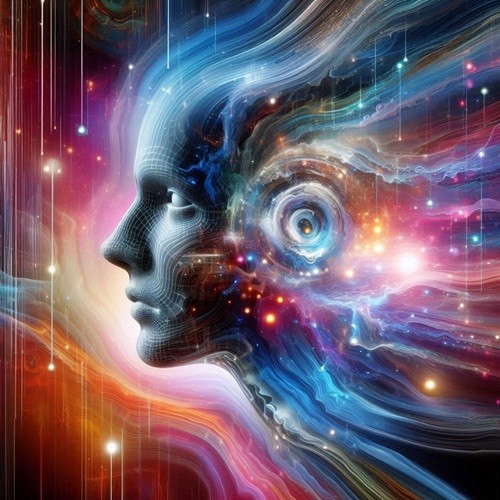
It should be noted that this virtual enlightenment project is a much-improved version of the original. We can describe artificial intelligence as virtual reality in the process of establishing its own subjectivity. A machine intelligence without biological limits, virtually immortal, might well acquire a god-like identity.
There is only one “small” problem here. After the intelligence explosion, why would machines want to continue to serve the primitive life form called human? At that point, what tools will humans use to keep artificial intelligence in a position of servitude? What guarantee is there that machines will not aim to destroy the human race? It is currently not possible to claim that the prediction that the human body will be integrated with artificial intelligence after the singularity and that the distinction between humans and machines will disappear is more than a wish.
Regardless of where it will lead, the consequences of a possibility like an intelligence explosion are far beyond any other technological revolution in human history, but the “subject” of this history can no longer be human. Technological singularity means the transition to the post-human age.
Reincarnation of Art
Metal Music Example
Metal Music Example
Internet Revolution
The first period of the Internet Revolution in the context of our subject can be considered as starting from 1993, when the technology in question started to penetrate into people’s daily lives and the MP3 format was released, and ending in June 1999 when Napster, a peer-to-peer program focused on sharing digital audio files, emerged. In the second half of the ‘90s, it became possible to access MP3 files from websites, and mp3.com was launched in December 1997, but it was Napster and its successor applications that dealt the real blow to the music market. People being able to access music files on each other’s computers took the piracy phenomenon to a new level. At this point, the producer-market-consumer chain was seriously damaged, and listeners began to access musicians’ recordings directly and with minimal effort. As a result, naturally, album earnings fell dramatically. While in the pre-Napster world, consumers had to make an effort and take on a serious cost to access the product, over time, the fact that the audience was listening to a song or album began to be considered a blessing.
The download era would not last long either. Towards the mid-2000s, the widespread use of ADSL worldwide and the development of smart phones a few years later began to relieve listeners of the hassle of storing music. Applications such as Myspace, YouTube, Spotify, Bandcamp, Deezer, SoundCloud, Amazon Music, and Apple Music, although they could not generate significant income for musicians, placed digital music formats on a certain legal basis. The structure of the market, which had shrunk during this period that continues to the present day, has been reshaped.
This transformation of the music industry would inevitably determine the evolution of metal. At the beginning of this process, as a result of the dramatic transformation that the rock music market went through in 1991, traditional forms of metal were excluded from the mainstream. The US scene, which had dominated the metal music market since 1983, continued to follow a trend-oriented course by taking this situation as a given. Nu metal was influential between 1998-2003, and metalcore after 2004, but this would not continue. Each new trend created less economic profit than the previous one, and by the 2010s this path was effectively blocked.
However, this situation only partially affected the evolution of metal, because the metal tradition was divided into two, which became apparent from 1996-1997 onwards. The European scene, centered on Germany and the Nordic countries, which emerged as a new focal at that time, focused on building a metal scene that, unlike the US, was independent of the general orientations of the music industry and had its own development dynamics. The revival of interest in the main genres of metal and the entry into a fusion period by combining them with new social and cultural realities were developments that could not have happened without this alternative market.
In those years, this phenomenon was perceived as a natural result of an increase in metal music production, but when the statistics of the ‘90s are examined today, it is understood that this may be partially true at most. In fact, the determining factor was not the rise of metal, but the increasing visibility of underground activity. 1996 and later were the years when the internet became commercial and exploded. In other words, the ontological basis of this development was essentially the underground scene being supported by the dynamics of the internet.
This upward trend continued to increase after Napster. The number of metal albums released each calendar year showed a steady increase compared to the previous one. The underground’s advancement over the mainstream brought extreme metal to the center of the genre. Black and death became the driving forces of metal. The fact that metal has a high underground/mainstream ratio also made it stand out against other musical styles. According to streaming statistics, metal became one of the most popular music genres. So, it was no surprise that Heavy Blog is Heavy, for example, claimed that metal was experiencing a golden age around 2015. Metal music production was perhaps better than ever in terms of both quantity and quality.
In other words, the Internet Revolution, first with the technical opportunities it provided and then with the blow it dealt to the industry, caused a genre that was practically on its deathbed at the beginning of the process to undergo a striking evolution.
Of course, at this point we are talking about the underground scene where commercial concerns are at a low level. It is not possible to claim that this phenomenon affects metal as a whole in the same way.
In the post-Napster reality, with the value attributed to music having plummeted and rock star status practically gone, it is almost impossible for a new band to achieve major commercial success. There seems to be a caste system in metal. The “top” bands consist of only a few who have historically risen there, and they are now on their last legs. The “middle” bands are effectively stuck in limbo. They have no chance of moving up, nor are they worried about losing their positions. The only possible transition is from “bottom” to “middle”, but this is hardly a common occurrence.
Metallica, as the biggest band in metal history, was trying to rise to a new level and strengthen its position in the rock music industry when it faced Napster. The exaggerated reaction of the band’s leader Lars Ulrich should be interpreted in this context. With Napster, all future plans of the band lost their meaning. After the band’s attempt to associate with nu metal on 2003’s St. Anger, they cut off their ties with market movements. Similarly, Judas Priest, who spent their entire career positioning themselves according to trends in rock music, changed their manner with Rob Halford’s comeback album Angel Of Retribution in 2005. There is no trend to be benefited from anymore. Bands at this level can move freely without worrying about the outcome, and their choice to not take risks and focus on the appreciation of the widest possible segment of their potential audience is actually the most commercial move they have.
The greatest damage done to metal by this process is seen in the “middle” level groups. Even though metal music generally resists abandoning the album format, for a significant portion of the bands in this category, albums have a simple tool function. The reality that no money can be made from albums anymore inevitably increases the importance of concerts and product sales, and making albums may not be much more than a reason to organize a new tour. This style of survival has inevitably seriously reduced the quality of the music produced.
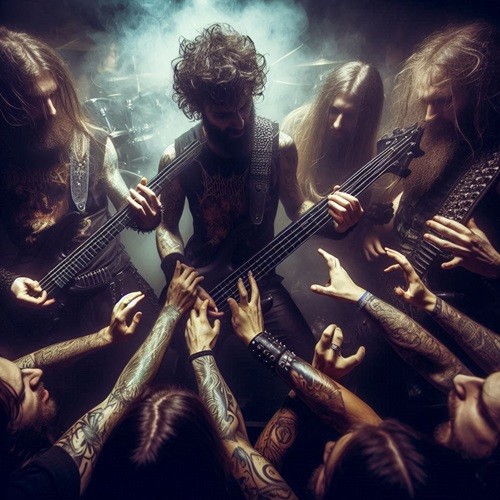
On the other hand, the “caste hierarchy” in question between bands is actually a manifestation of a kind of “democratization process”. As we saw when talking about the US scene, the major record companies that once held the helm are effectively out of the equation. New rock stars are not emerging, and it is not possible to claim that the existing ones can maintain their old mythic positions. In an environment where concerts and festivals are becoming increasingly important, unity is taking place at the grassroots level. The distance between listeners and musicians is gradually closing.
Artificial Intelligence Revolution
With the launch of Suno in December 2023 and Udio in April 2024, it is highly likely that a new phase will be entered in the process we discussed above.
In fact, the history of using artificial intelligence in the field of music is very old. Even in the 1950s, we come across pieces composed by computers. In other words, the relationship between artificial intelligence and music does not present any innovation. At this stage, the point that has the potential to be groundbreaking is that these programs and similar ones eliminate the need for technical knowledge in order to create music through artificial intelligence. While anyone who wants can now create their own compositions with simple written commands, the music industry is trying to prevent the process through litigation, as it did in the time of Napster.
Before these developments, the most important attempt to bring artificial intelligence to the metal world was Dadabots. This two-person formation, influenced by names such as Krallice, Meshuggah, The Dillinger Escape Plan, and Archspire, has carried out various albums and projects since 2017.
Nowadays, as expected, the number of virtual metal bands is increasing. Frostbite Orckings, who operate under a collective called Metalverse, has garnered a lot of attention for claiming to have released the first heavy metal album created by artificial intelligence.
But it seems unlikely that they will be important in terms of the evolutionary dynamics of the process. The trend is certainly not for musicians to be replaced by virtual bands. Napster-related developments have caused changes in the market structure. Artificial intelligence threatens the position of producers as well as the industry. As applications develop and the amount of data they process increases, the need for musicians will gradually decrease. Music, and art in general, will become an individual experience.
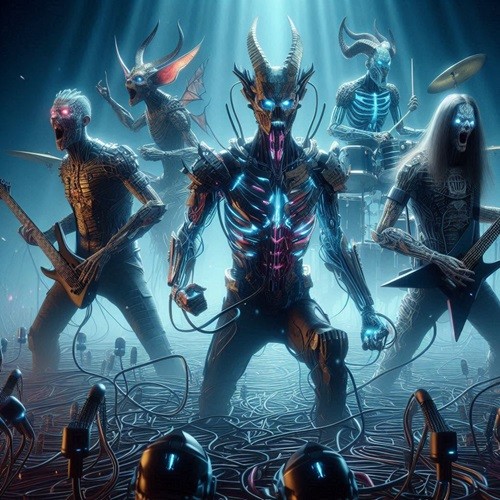
Let’s think about what artificial intelligence programs could potentially accomplish. First of all, due to their advanced technical analysis capabilities, these applications will have a better grasp of the musical structures of the bands than even the musicians who composed them at the time. Instead of waiting 7 years to listen to an album like 72 Seasons, you can create your own Metallica albums in seconds. If you want, create a version of Ride The Lightning, or include certain periods of the band in the result in the proportions you want. At this point, you will not have to be content with the bands’ own musical boundaries either. Would you like to hear how Motörhead’s narrow patterns would sound when interacting with different styles? Changing the musicians of existing albums can also yield interesting results. For example, how about listening to The Fragile Art Of Existence with Warrel Dane’s vocals? Or, would you predict which bands Chuck Schuldiner would be influenced by, if he had not passed away and created new Death and Control Denied albums accordingly? Of course, beyond these and similar possibilities, the most important thing is that listeners will be able to make their own compositions using the musical elements they want.
There are currently no legal restrictions on the applications. Similarly, unlike the Napster era, the issue of copyright is quite controversial. Still, over time, musicians and bands can be expected to be included in the system and, when technically possible, start publishing their own official programs.
Of course, there will be those who resist this process. Aside from the difficulty of completely eliminating demand for “organic” products, logically the strong underground metal scene could sustain itself to some extent for many years. But it’s not that simple.
Consider The Metal Archives’ decision not to accept artificial intelligence-generated music on its site. While they may have different arguments, trying to keep track of a phenomenon that is likely to grow astronomically in number in a short time and is becoming increasingly individual would be a futile effort anyway. So there’s no problem here. At some point, artificial intelligence itself could also start to uncover bands’ studio tricks. But what do we do with albums composed by artificial intelligence and recorded by professional bands? Given that musicians will logically subject them to a certain amount of editing, it will be virtually impossible to identify the real composer. How can we prevent artificial intelligence from infiltrating every aspect of metal, including conservative platforms like The Metal Archives?
How realistic is it to expect musicians not to resort to such a functional tool when they already have it at their disposal? How much resistance can you show to an application that offers you the amount of musical material that would take you months, perhaps years, to produce as a composer for a professional band, in a very short time, and in a way that reflects your own style?
The inclusion of artificial intelligence in the equation will inevitably trigger a crisis of trust in musicians among listeners. In an environment where every album could potentially be prepared with the support of artificial intelligence, music will not retain the value it once had in the eyes of listeners. As suspicion of the work increases, the value given to it will decrease proportionally. In other words, it is not necessary to wait for the period when artificial intelligence-created music will be deemed more valuable to see human-made music become worthless.
Even new musicians who might be considered geniuses in the pre-artificial intelligence reality will not be able to make a difference under these conditions. While the only names that are given importance are those who have achieved this status in their time, they will find themselves in a grueling competition with artificial intelligence. Let’s assume that Steve Harris chooses to stay away from artificial intelligence. While there are many new compositions that seem to have come out of Iron Maiden’s brightest periods and interesting experiments based on this musical structure, will the fact that a song was written by the “real Steve Harris” be enough to make it important? Trying to create the best versions of one’s own music by using artificial intelligence, openly or implicitly, in order to keep interest alive, seems like a more logical course of action, at least in the short term, but it should be expected that sooner or later these transformation pains will end and music will become an individual experience, as mentioned above.
At this point, one may encounter claims that artificial intelligence will not be able to go beyond being a craftsman and produce art, and will be inadequate in reflecting human emotions. The art-craft distinction and the soul-body dualism... Could these theoretical assumptions really be natural limits that will halt the progress of artificial intelligence in this field?
To start from the end and eliminate unnecessary philosophical discussions, the level that artificial intelligence has reached in its infancy should provide a strong enough practical answer to this idealistic claim. Looking at the revolutionary developments triggered by the phenomenon called big data in the field of artificial intelligence, it can be said that computers can successfully imitate all kinds of emotions under conditions where sufficient data accumulation is provided. After all, the issue is not that artificial intelligence acquires human emotions, but that it can analyze and reproduce them.
As for the art-craft distinction, which dates back to the beginning of the 15th century, this was a result of the enlightenment winds that began to blow in Italy and reflected a liberal approach that prioritized individual creativity over collective production. Some of the painters whose products were valued per square meter in the past quickly achieved star status. In other words, the main element that distinguished the artist from the craftsman was the extra value created by the signature of the former. However, this does not mean that artistic production is specific to individuals in this category. A contrary perspective would lead to the absurd conclusion that non-Western societies that do not recognize this distinction do not have the capacity to produce art. Although there is a professional difference between the artist and the craftsman, this relationship is not identical to the art-craft distinction. In short, one does not have to be convinced that artificial intelligence deserves the artist epaulette in order for its products to be considered works of art.
Conclusion
From the analysis conducted so far, it is understood that artificial intelligence will carry the tendencies of the internet era to their logical conclusions. Phenomena such as the devaluation of music and the closing of the gap between the musician and the listener are beginning to gain an absolute identity under the new conditions.
Even if some branches of art feel the effects of this less than others, art has entered a transformation process. Of course, the analyses above may not be directly valid for some branches of art, but there should be no harm in claiming that the picture presented specifically for metal music reflects the general orientation of artificial intelligence towards art. The technical tools it provides have the potential to cause irreparable damage to established market structures. For example, imagine the earthquake that applications that offer the opportunity to prepare films with the quality of Hollywood productions will create in the film industry. As artificial intelligence develops, art will cease to be a commercial activity.
Another issue that has already been touched upon is the dark future of human art. Not only artistry as a profession but also human-made art is under threat in the face of artificial intelligence. On the one hand, the reality that human art is increasingly turning into an activity that does not generate financial income, and on the other hand, the fact that it will become impossible to compete with machines in time will lead this outcome.
This stage that is expected to be reached corresponds to the manifestation of the phenomenon we call the Age of Endarkenment in the field of art. In fact, this second part of the article should be evaluated as an analysis of the transition process leading to it. Art is being transferred from one structure to another. At the cost of gradually fading away in the organic but limited human-material reality, it is being reestablished in the mechanical but vast human-virtual reality. Therefore, it would be appropriate to talk about the reincarnation of art, not the possibility of its death.
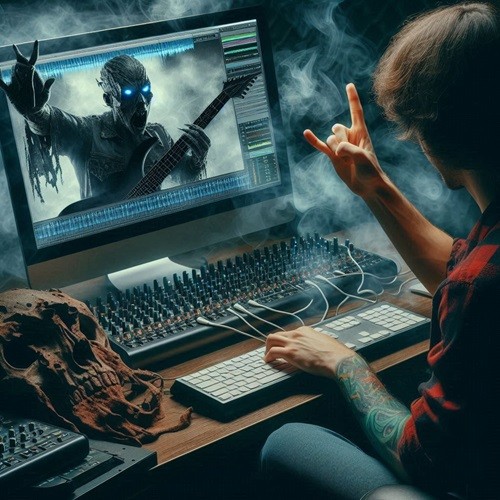
These statements may not seem pleasant, but if ideological preconceptions are left aside, it will be realized that this is not actually a doomsday scenario. This new ground brings with it the opportunity to expand the horizons of art as much as possible with the material facilities it will provide.
We have given some examples above of what artificial intelligence can offer us in metal music. Now let’s try to think about the evolution of metal in a more systematic way.
If metal music’s globalization and synthesis ability were not so high, the opportunities offered by the Internet Revolution could only be partially utilized. This flexibility gives metal a serious evolutionary power. On the one hand, metal tends to spread to every part of the world and every culture, and on the other hand, it can be alloyed with every kind of music. However, despite all this, only a small part of the possible evolution of metal has become a reality today, and this process will progress very slowly under human artistic conditions.
What could change when artificial intelligence reaches its potential in the field of music? The existence of a machine intelligence with in-depth knowledge of all musical genres and cultures on earth would logically lead the evolution to its limits in this field. All kinds of changes that genres can experience both within themselves and in synthesis have already potentially occurred within the structure of artificial intelligence. In an environment where countless actors produce individual music every day through artificial intelligence and the industry as we know it has disappeared, the evolutionary process ceases to be a linear phenomenon and becomes atomized. From this point on, music will no longer have a history.
Guest article disclaimer:
This is a guest article, which means it does not necessarily represent the point of view of the MS Staff.
This is a guest article, which means it does not necessarily represent the point of view of the MS Staff.
Comments
Comments: 24
Visited by: 109 users
| musclassia Staff |
| poring dark Posts: 50 |
| Karlabos |
| Cynic Metalhead Ambrish Saxena |
| Ivor Staff |
| Karlabos |
| Ivor Staff |
| Karlabos |
| Ivor Staff |
| Desha delicious dish |
| Emre Gorur |
| Ivor Staff |
| Desha delicious dish |
| Emre Gorur |
| Emre Gorur |
| poring dark Posts: 50 |
| Starvynth i c deaf people Staff |
| poring dark Posts: 50 |
| Emre Gorur |
| poring dark Posts: 50 |
| Ivor Staff |
| Emre Gorur |
| Ivor Staff |
| nikarg Staff |
Hits total: 1912 | This month: 83


